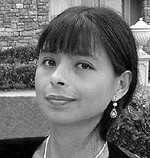Jilma Meneses JD ’92
Open gallery

Advancing Cultural Competency at OHSU
When Lewis & Clark Law School came calling, Jilma Meneses was knee-deep in civil rights work—she was coordinating nine Head Start programs for Hispanic migrant farmworkers in central California.
She visited the law school’s campus and was captivated with its curriculum, faculty, and serene surroundings. Realizing that she could break down more barriers with a law degree in hand, she soon began her studies.
Meneses now directs the Affirmative Action and Equal Opportunity Department at Oregon Health & Sciences University. Ambitiously, she is taking the organization beyond its policy of zero tolerance for discrimination to a broader understanding of diversity called cultural competency.
“Diversity is much more than ethnicity, age, or gender,” she says. “I’m Latin American, and my family is from Nicaragua. But the color of my skin does not reflect my diversity.”
More compelling, she says, are people’s life experiences—their education, work, travel, and cultural interactions—along with the lessons they learn, and the ways in which they choose to grow.
With strong support from OHSU’s key administrators, she built the department from the ground up. With a four-person staff and consultants, the department conducts civil rights investigations and engages in other functions, including training and outreach.
“My biggest challenge is trying to change the inappropriate behavior of people who are set in their ways,” she says. “At times, education, training, and coaching succeed. Extreme cases require termination. It can be emotionally draining for everyone involved.”
Meneses finds balance in guiding health care professionals toward a deeper understanding of other cultures, their patients, and, ultimately, themselves.
“The respect and autonomy OHSU has given me to expand my program and take it to a new level is extremely rewarding,” she says.
Last year, Meneses led a six-person team to the Democratic Republic of Congo, where students and top researchers evaluated health and education partnership opportunities.
“Many medical students have never been out of the United States, and they’re starved for international experience,” she says. “Being immersed in other cultures during their training makes them better health professionals.”
Meneses’ commitment to cultural competency extends beyond her professional life. Last November, she adopted an 8-year-old daughter from a Congolese orphanage named Jamaa Letu, which means “our family” in Swahili. Her 9-year-old birth daughter went along to learn about her new sister’s previous way of life and culture.
“The experience was absolutely necessary for the growth of both daughters,” she says, “and it profoundly changed all of our lives.”
—by Pattie Pace
More L&C Magazine Stories
Lewis & Clark Magazine is located in McAfee on the Undergraduate Campus.
MSC: 19
email magazine@lclark.edu
voice 503-768-7970
fax 503-768-7969
The L&C Magazine staff welcomes letters and emails from readers about topics covered in the magazine. Correspondence must include your name and location and may be edited.
Lewis & Clark Magazine
Lewis & Clark
615 S. Palatine Hill Road MSC 19
Portland OR 97219

